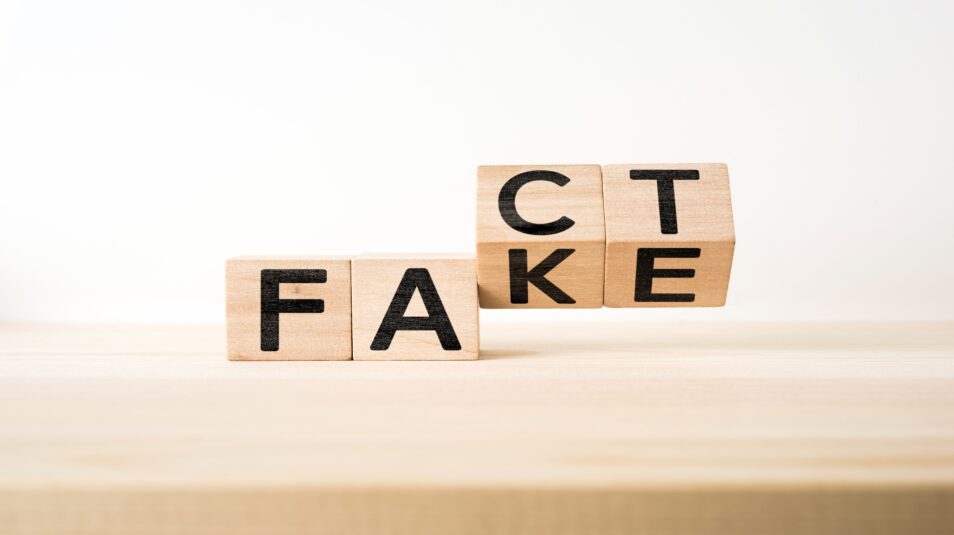Protecting Your Company From Misinformation via Behavioral Science

Leadership
April 8, 2021
Gleb Tsipursky
CEO of Disaster Avoidance Experts
Topics
behavioral science, blind spots, cognitive biases, cognitive fluency, data, mental blindspots, misinformation, process information, StrategyIf you listen to something repeated, it really feels a lot more accurate when you hear it repeated. To put it simply, repetition makes any kind of statement seem truer. In other words, anything you hear will feel a lot more true each time you hear it once again. Cognitive neuroscientists like myself call this the “illusory truth effect.”
Recall your experience when you read the first sentence of this article. It probably felt strange and disconcerting, perhaps with a tone of outrage, as in “I don’t believe things more if they’re repeated!”
Reading the second sentence did not inspire such a strong reaction. Your reaction to the third sentence was tame by comparison.
Why? Because of a phenomenon called “cognitive fluency,” meaning how easily we process information. Much of our vulnerability to deception in all areas of life – including misinformation – revolves around cognitive fluency in one way or another.
Now think about how rumors spread in your organization’s grapevine. It works on the same principle. Employees hear a rumor – say about a proposed headquarters move. It feeds into their fears, which is a very cognitively fluid part of our minds. They repeat the rumor, and it goes around, and then they keep hearing it from others. It begins to seem more and more true, regardless of reality. Before you know it, those who want to stay where they are looking for another job, even though you might never have intended to move your headquarters!
Fortunately, we can learn about these mental errors, which helps us address misinformation and make our workplaces more truthful.
The Lazy Brain
Our brains are lazy. The more effort it takes to process information, the more uncomfortable we feel about it and the more we dislike and distrust it.
By contrast, the more we like certain data and are comfortable with it, the more we feel that it’s accurate. This intuitive feeling in our gut is what we use to judge what’s true and false.
Yet no matter how often you heard that you should trust your gut and follow your intuition, that advice is wrong. You should not trust your gut when evaluating information where you don’t have expert-level knowledge, at least when you don’t want to screw up. Structured information gathering and decision-making processes help us avoid the numerous errors we make when we follow our intuition. And even experts can make serious errors when they don’t rely on such decision aids.
These mistakes happen due to mental errors that scholars call “cognitive biases.” The illusory truth effect is one of these mental blindspots; there are over 100 altogether. These mental blindspots impact all areas of our life, from health and politics to relationships and even shopping.
Besides illusory truth, what are some other cognitive biases you need to beware of to protect your organization from misinformation? If you’ve heard of any cognitive biases, you’ve likely heard of the “confirmation bias.” That refers to our tendency to look for and interpret information in ways that conform to our prior beliefs, intuitions, feelings, desires, and preferences, as opposed to the facts.
Again, cognitive fluency deserves blame. It’s much easier to build neural pathways to information that we already possess, especially that around which we have strong emotions; it’s much more difficult to break well-established neural pathways if we need to change our mind based on new information. Consequently, we instead look for information that’s easy to accept, that which fits our prior beliefs. In turn, we ignore and even actively reject information that doesn’t fit our beliefs.
Fixing Our Brains
Unfortunately, knowledge only weakly protects us from cognitive biases; it’s important, but far from sufficient.
What can we do? You can use decision aid strategies to address cognitive biases to defend your organization from misinformation.
One of the most effective strategies is to help your employees and yourself build up a habit of automatically considering alternative possibilities to any claim you hear, especially claims that feel comfortable to you. Since our lazy brain’s default setting is to avoid questioning claims, which requires hard thinking, it really helps to develop a mental practice of going against this default. Be especially suspicious of repeated claims that make you feel comfortable without any additional evidence, which play on the illusory truth effect and the confirmation bias combined.
Another effective strategy involves cultivating a mental habit of questioning stories in particular. Whenever you hear a story, the brain goes into listening and accepting mode. Remember that it’s very easy to cherry-pick stories to support whatever position the narrator wants to advance. Instead, look for thorough hard numbers, statistical evidence, and peer-reviewed research to support claims.
More broadly, you can encourage employees to make a personal commitment to the twelve truth-oriented behaviors of the Pro-Truth Pledge by signing the pledge at ProTruthPledge.org. All of these behaviors stem from cognitive neuroscience and behavioral economics research in the field called debiasing, which refers to counterintuitive, uncomfortable, but effective strategies to protect yourself from cognitive biases. Peer-reviewed research has shown that taking the Pro-Truth Pledge is effective for changing people’s behavior to be more truthful, both in their own statements and in interactions with others.
These quick mental habits will address the most fundamentally flawed aspects of our mind’s tendency to accept misinformation.





